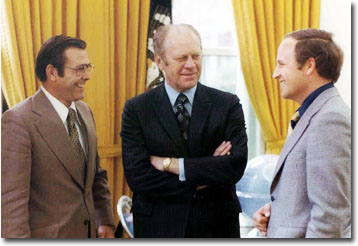Ford White House considered warrantless wiretapping and decided against it for legal reasons

The National Security Archive at George Washington University revealed Friday that despite objections from then-Secretary of Defense Donald Rumsfeld and then-CIA director George H. W. Bush, President Gerald Ford came down on the side of a proposed federal law to govern wiretapping in 1976 instead of relying on the "inherent" authority of the President because the "pros" outweighed the "cons," according to internal White House documents obtained through the Freedom of Information Act.
White House counsel Philip Buchen described a Situation Room meeting on March 12, 1976 with Rumsfeld, Secretary of State Henry Kissinger, Bush, national security adviser Brent Scowcroft, and attorney general Edward Levi (notably absent was White House chief of staff Richard Cheney) in which Buchen's and Levi's outline of the advantages of a wiretapping law reduced the "adamant opposition" to neutrality, allowing Levi to testify before Congress in favor of a wiretapping statute on March 29, 1976.
Buchen's talking points said the proposed law (ultimately enacted as the Foreign Intelligence Surveillance Act of 1978, or FISA) "avoids likelihood that … courts will eventually decide a warrant is required," "eliminates question of validity of evidence obtained," "protects cooperating communications carriers," and would not "materially inhibit surveillance of these kinds of targets."
On the "cons" side of his talking points, Buchen described exactly the arguments against such a law that the Bush administration has now adopted as the basis for its warrantless wiretapping: "requires resort to the judiciary for exercise of an inherent Executive power" and "could result in troublesome delays or even a denial of authority in particular cases."
_______________________________________________

In related news, Sen. Arlen Specter (R-PA; senator in charge of a hearing on the program) said Sunday he believes that President Bush violated a 1978 law specifically calling for a secret court to consider and approve such monitoring. The Pennsylvania Republican branded Attorney General Alberto Gonzales' explanations to date as "strained and unrealistic."
The top Democrat on the Senate Judiciary Committee, Vermont Sen. Patrick Leahy, predicted that the committee would have to subpoena the administration to obtain internal documents that lay out the legal basis for the program. Justice Department officials have declined, citing in part the confidential nature of legal communications.


0 Comments:
Post a Comment
<< Home